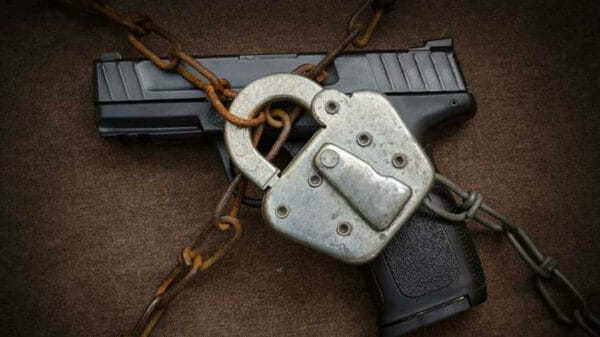
The Department of Justice (DOJ) has unveiled two new proposed gun control rules. According to the agency, the new proposed rules bring the Department’s rules regarding firearms into compliance with the Bipartisan Safer Communities Act (BSCA).
The BSCA was passed by mostly Democrats, with 15 Republicans led by John Cornyn (R-TX) crossing the aisle to back it. It was passed in the wake of a tragedy in Uvalde, Texas, where a gunman shot and killed multiple children at an elementary school. Although none of the provisions of the law would have prevented the tragedy, Democrats were quick to exploit it to pass the gun control bill. Biden signed it into law. It was the first major gun control package since the Clinton era “assault weapons ban” that expired in 2004.
The press release reads: “The Justice Department today announced it has submitted to the Federal Register two notices of proposed rulemaking (NPRM) that, if finalized, will fully implement the Bipartisan Safer Communities Act of 2022 (BSCA), the most significant gun safety legislation in over 30 years.”
“Following the language of the BSCA, the Firearm Handlers Rule proposes that federal firearm licensees (FFLs), such as gun stores, be allowed to use the National Instant Criminal Background Check System (NICS) to voluntarily conduct employment background checks for certain employees. Current NICS regulations prohibit FFLs from initiating background checks for any purpose other than the transfer of firearms. Under the Firearm Handlers NPRM, FFLs will be permitted to request NICS background checks for current or prospective employees who may handle firearms, ammunition, or related materials. The Firearm Handlers Rule NPRM details the scope of employees eligible for background checks, as well as new NICS statuses proposed for such checks.”
“The second NPRM, known as the Under-21 Rule, would codify enhanced NICS background check procedures for prospective firearm purchasers under 21 years of age, among other changes. Under the BSCA, NICS is required to conduct enhanced background checks for such under-21 purchasers, by contacting certain state and local entities to determine if a juvenile record, such as a criminal conviction or mental health record, may disqualify the purchaser from possessing a firearm. The FBI began performing these enhanced checks in late 2022 and has denied nearly 1,000 transactions solely because of enhanced outreach.”
The first new rule (AG Order No. 6099-2024) addresses gun store owners’ ability to run background checks on their employees. Currently, NICS checks can only be run in connection with transferring a firearm or ammunition in states requiring a NICS background check to purchase the products. The new rule lets these gun store owners run the checks on prospective employees. The checks will return various new statuses. These new statuses include “pass,” equal to the current “approved” response. The “delayed” status would equal “pending” for the employee subject to the background check. The final new status under this rule is “did not pass,” which equals “denied.”
The second proposed rule (AG Order No. 6100-2024) deals with enhanced background checks for gun buyers under 21. The rule allowed the FBI to reach out to various local and state organizations to get a prospective gun buyer’s juvenile criminal and mental health records. The rule adds a new response for when local agencies fail to respond. That response is “No Known Prohibitors: At least one state or local agency has not responded or cannot respond.” State and local agencies do not have to respond to the FBI’s inquiries; some are explicitly barred from responding by state law.
By citing the BSCA, the DOJ gets around legal challenges that have sunk other rules, such as bump stocks, pistol stabilizing devices, and unfinished frames. The courts ruled that these Bureau of Alcohol, Tobacco, Firearms and Explosives (BATFE) rules exceeded their authority under the Administrative Procedures Act (APA). APA challenges have been key to defeating gun control. The DOJ also can not rely on Chevron deference since the Supreme Court invalidated that defense. Chevron deference gave the final say on the meaning of a law to the regulating agency.
The rules will be posted to the Federal Registry for public comment. After the comment period, a final rule might be drafted, or the rule might be pulled altogether. The rules are being proposed under the Biden Administration, but due to the comment period, if a final rule is unveiled, it will be under a Trump Presidency. This change in power means that the new president or his DOJ could kill the new regulations with the stroke of a pen.
About John Crump
Mr. Crump is an NRA instructor and a constitutional activist. John has written about firearms, interviewed people from all walks of life, and on the Constitution. John lives in Northern Virginia with his wife and sons, follow him on X at @crumpyss, or at www.crumpy.com.

from https://ift.tt/10WqApf
via IFTTT

No comments:
Post a Comment